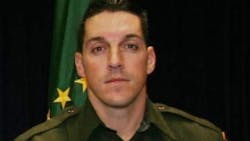Suspected Gunman in Slaying of Border Agent Captured in Mexico
PHOENIX — A member of a drug-robbery ring suspected in the 2010 shooting death of a Border Patrol agent in Arizona has been arrested deep in Mexico, leaving just one member of the original “rip crew” still at large in a case that highlighted the failings of a gun-tracking operation that let firearms fall into the hands of criminals in Mexico, authorities said.
The suspect, identified by the Mexican military only as “Heraclio N.,” was apprehended Wednesday in an area known as the Golden Triangle, the confluence of three states where drug cartels control vast stretches of territory.
“At the request of the authorities in the U.S., naval personnel arrested Heraclio N. on the border of Sinaloa and Chihuahua,” the Mexican navy said in a statement.
Though Heraclio N. was not fully identified, an extradition order issued in December 2011, more than a year after the death of Border Patrol Agent Brian Terry, refers to a suspect named Heraclio “Laco” Osorio-Arellanes. The U.S. government was offering a $250,000 reward for information about Osorio-Arellanes.
Heraclio N. was being held Thursday on suspicion of murder, theft and illegal use of a weapon. A previous suspect in Terry’s death was held for two years before he was extradited to the United States.
Terry and three other Border Patrol agents were on duty in a section of Peck Canyon near Rio Rico, Ariz., on Dec. 14, 2010, when they encountered a heavily armed six-man team that had allegedly sneaked across the border and was headed to rob marijuana dealers. Their illegal operation was known as a “rip crew,” U.S. authorities said.
According to court papers, one of the agents shouted “Police!” in English and Spanish, and fired nonlethal beanbag rounds. The rip crew responded with gunfire.
Terry, 40, was struck by a single bullet and mortally wounded. One of the crew members was shot in the torso. The other Mexicans fled back across the border.
The Naco, Ariz., Border Patrol station was renamed after Terry in 2012.
Two guns found at the scene were eventually traced to a member of a gun-smuggling ring that was being monitored in a Justice Department-sanctioned, gun-tracking operation known as Fast and Furious.
The aim of the operation was to let guns cross into Mexico and to monitor how and where they were used. U.S. authorities have been criticized for allowing informants to walk away from Phoenix-area gun shops with weapons rather than immediately arresting them.
The scandal captured Washington’s attention for a time, as the insurgent tea party wing of the Republican Party cudgeled the fledgling Obama presidency in congressional hearings over Fast and Furious. The furor resulted in the resignation of the head of the U.S. Bureau of Alcohol, Tobacco, Firearms and Explosives and underlined one of the signature failures of the Obama administration. The ATF lost track of 1,400 of 2,000 firearms that were being monitored.
The government of Mexico announced Heraclio N.’s arrest Thursday, proclaiming it as evidence of the country’s commitment to working with American authorities.
The arrest comes during a period of strained relations between the two countries, prompted by allegations by President Donald Trump and conservative politicians that Mexican migration is a major source of crime in the U.S., a contention refuted by social science and criminal justice statistics.
As for the rip crew’s remnants, in 2015, Ivan Soto-Barraza and Jesus Leonel Sanchez-Meza were each tried and convicted in Tucson, Ariz., of first-degree murder in connection with Terry’s death.
Manuel Osorio-Arellanes, who was shot and apprehended the night of the confrontation, is serving a 30-year sentence after pleading guilty to first-degree murder, as is Rosario Rafael Burboa-Alvarez. It is unclear what, if any, relation there is between Manuel Osorio-Arellanes and Heraclio Osorio-Arellanes, the man who appears to be Heraclio N.
The U.S. government is still offering a $250,000 reward for information leading to the arrest of another alleged member of the rip crew, Jesus Rosario Favela-Astorga, who is still at large.
Copyright 2017 Los Angeles Times
Tribune News Service
